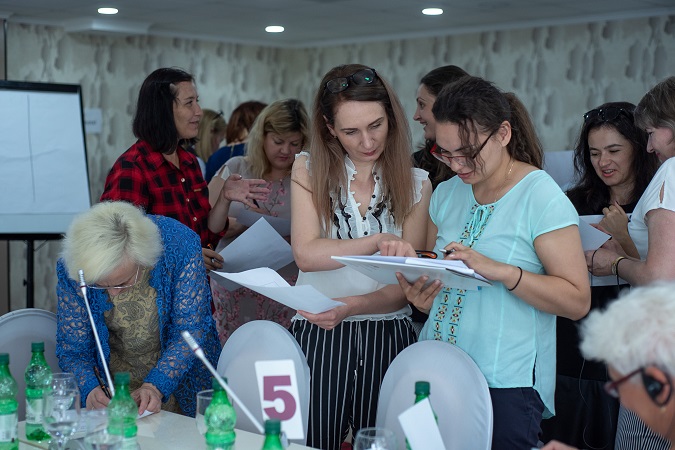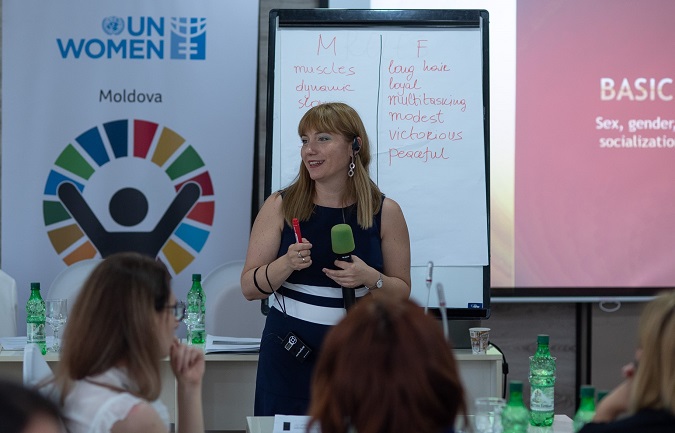Marija Risteska: “Gender responsive budgeting takes in consideration the needs and interests of women and men and creates public value”
Date:
The way how public budget is allocated and spent affects both women and men. How can the budget reflect equally the needs of women and men? How can the local budget cover the most important issues of the community? These are some of the topics discussed in an interview with Marija Risteska, Gender Responsive Budgeting (GRB) expert.
Gender responsive budgeting is an initiative which seeks to influence the budgetary process to advance gender equality and women’s empowerment. It is about bringing the voice of the civil society into matters of governance and increasing women’s participation in decision-making processes. In June 2018 representatives of 20 civil society organizations from Moldova learned more about Gender Budget Watchdog Reporting during a three-day workshop organized by UN Women Moldova as part of the regional project „Promoting Gender Responsive Polices in South-East Europe and the Republic of Moldova”, financially supported by the Austrian Development Agency”. Participants developed their knowledge and skills to monitor the impact of public policies and public spending on women and men.

- How would you define Gender Responsive Budgeting and its impact on the lives of women and men?
- I define GRB as ‘good budgeting’, one that takes in consideration the needs, interests and priorities of women and men and delivers for both women and men. Gender responsive budgeting is one of the recent transformative policy making tools that create public value (policies made, services delivered are valued by the public as good for them) improve governance and eventually might contribute to increased trust in Government. The transformative power of this tool for everyday lives of women and men is remarkable, as it can be applied on individual level, on community level, on municipal, regional and state level.
- How did GRB make an impact in your country, Macedonia?
- GRB has been introduced in Macedonia since 2012 and this has been facilitated through a Strategy for Gender Responsive Budgeting and by changing the budget circular for state level institutions. UN Women has supported the whole process with technical assistance, capacity building and mentoring. In the last four years the GRB goes local in Macedonia. 20 pilot municipalities produce gender analysis of their programs and develop gender aware policies and budgets. As a result, we have impacted lives of women in rural areas by providing them: opportunities to start a business from their homes; bus lines to nearby cities; child care facilities in 6 villages. Furthermore, we have changed the lives of urban women by providing them with: lightning of walking trails; night bus stops; transportation for people with disabilities; home care services for elderly; subsidy schemes for cancer treatment.

- What are the differences in the implementation of GRB at the local and central levels?
- Although we have a compulsory gender budgeting on central level the central institutions are still in the process of gender analysis and have not yet budgeted responsively. The results we have currently is from local level where the tools are not compulsory in use, but there is a strong commitment of municipalities to GRB. UN Women together with the Association of local self-governments in Macedonia are working on expanding the scope of the use of GRB tools to all municipalities by providing capacity building and creating a platform for knowledge management that disseminates policy products, activities and case studies of how GRB is implemented and what impact it has.
- Why is it important that civil society is involved in GRB monitoring?
- Working with civil servants and on the system for introduction of gender budgeting is not enough. We must create a mechanism that will hold the government, that committed to the use of GRB, accountable. The best way to do it is through civil society organizations and activists who act as gender budget watchdogs. The budget is too important a document to be left to the discretion of government bureaucrats and elected representatives. Civil society organizations, through their budget work, will have insight into the collection of revenue and distribution of expenditures, dealing with issues like equity, fairness, and efficiency. Through the gender budget reports, they will inform citizens but will also advocate for policy and budget change which eventually will make government more accountable on how they spend public money and whether by doing this they create more (in)equality.
- How could civil society from Moldova ensure that local government is responsive to recommendations from its gender budget watchdog reporting?
- Civil society must first do a sound gender analysis of the different needs of women and men, then cross analyze the local policies and budgets with the needs and priorities of women and men. Once they have recommendations on how, through the local budget, to enhance programs and budgets equality, they need to engage in participatory policy making and budgeting processes (consultations on local level) where they can persuade local authorities to adopt the advocated measures. This is a long-term process and success in the first year is possible on local level, whereas impact on state level can be expected in two years’ time or more. For state level I recommend inclusion of gender advocates in the sectoral working groups that are part of the Medium-Term Budget Framework Coordination body.
- Thank you for the interview.